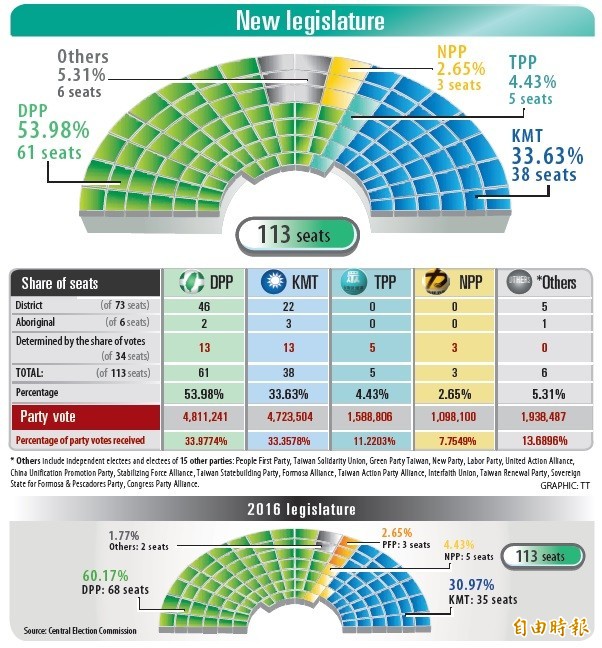《TAIPEI TIMES》 Local factions lose power: academics
‘DEMOCRATIC SYSTEM’: The diminishing power of local factions would force candidates to communicate with the public, University of Taipei associate professor Timothy Ting said
By Sean Lin / Staff reporter
Following tightly contested legislative elections on Saturday, academics expressed their opinions on the potentially diminishing effects of local factions on politics and weighed in on variables that Taipei Mayor Ko Wen-je’s (柯文哲) Taiwan People’s Party (TPP) could bring to the Legislative Yuan.
Asked about the Democratic Progressive Party (DPP) and the Chinese Nationalist Party (KMT) being closely matched with regard to the number of party votes won, Taiwan Association of University Professors vice president Chen Li-fu (陳俐甫) said the result signals that the KMT and the DPP secured their “default” support base.
The KMT had better prospects going into the elections than it did in 2016, when then-president Ma Ying-jeou (馬英九) canceled a year-end cash gift for civil servants and consistently received an approval rating of about 10 percent, Chen said, adding that although the KMT was defeated in Saturday’s presidential election, it still had life left in it.
Meanwhile, the DPP had regrouped from a bitter presidential primary between President Tsai Ing-wen (蔡英文) and former premier William Lai (賴清德) and rallied from a crushing defeat in the 2018 local elections, thanks to the pro-democracy protests in Hong Kong and a US-China trade dispute, both of which were capitalized on by Tsai to boost her popularity, he said.
Regarding the prospect of the TPP — which emerged as the third-largest party in the legislature by winning 11.2 percent of the party vote for five legislator-at-large seats, Chen said the party’s sole purpose is to advance Ko’s popularity.
To this aim, Ko has purposefully placed his most trustworthy aide, former Taipei City Government adviser Tsai Pi-ju (蔡璧如), in a safe position on the the party’s list of legislative-at-large nominees to ensure she lands a seat, he said.
The soon-to-be formed TPP caucus would not be a decisive minority in the legislature, but would be able to provide checks and balances during cross-caucus negotiations by freezing bills sponsored by the DPP on Ko’s instructions, thus giving it a difficult time, he said.
Much like the People First Party, fronted by Chairman James Soong (宋楚瑜), the TPP is a “one-man party” that is likely to disintegrate if a presidential bid by Ko in 2024 is unsuccessful, he added.
University of Taipei associate professor Timothy Ting (丁庭宇) shared a similar opinion on the TPP, saying that Ko could seek to grow his party by poaching members of other parties.
If by any chance regional lawmakers of the KMT feel insecure, they could fall prey to Ko’s poaching, Ting said.
He dismissed Ko’s bid to form an “opposition alliance” with the KMT and New Power Party (NPP), saying that there is no reason for the KMT caucus, which is much larger, to join the TPP caucus.
The function of the TPP and NPP legislative caucuses would be to elaborate on their values — for example by participating in votes on bills, despite knowing that their motions will not pass, Ting said.
Commenting on the defeat of KMT legislative candidate Chang Chia-chun (張嘉郡) — daughter of former Yunlin County commissioner Chang Jung-wei (張榮味) — to former Yunlin County commissioner Su Chih-fen (蘇治芬) of the DPP, Ting said it had to do with Council of Agriculture Minister Chen Chi-chung’s (陳吉仲) resourcefulness in stabilizing local peanut wholesale prices and accusing the Chang family of manipulating peanut prices for profit.
The Chang family had asked peanut farmers to boycott the council’s purchases of the crop to help plummeting prices rally.
Political pedigrees do not seem to work as well as they used to, Ting said, citing the defeats of KMT legislators John Wu (吳志揚), son of former KMT chairman Wu Poh-siung (吳伯雄), and Huang Chao-shun (黃昭順), daughter of former Control Yuan member Huang Tzuen-chiou (黃尊秋).
“Local factions failing is a good thing for a democratic political system, as it would force candidates to communicate their political beliefs [with voters] and allow the not-so-fortunate people to participate in elections as well,” he said.
National Taiwan Normal University political science professor Fan Shih-ping (范世平) attributed KMT Legislator Yen Kuan-heng’s (顏寬恆) defeat at the hands of Taiwan Statebuilding Party candidate Wonda Chen (陳柏惟) to a large number of people who moved to Taichung over the past several years and do not necessarily defer to “vote captains.”
Wonda Chen’s appeal to defeat local factionalism likely worked out and motivated younger voters working in other cities to return to their hometowns to cast their votes, Fan added.
On failed re-election bids of some KMT legislators, including Huang Chao-shun and Apollo Chen (陳學聖), Fan said they are mostly old faces, while the DPP has been promoting young candidates.
The defeated KMT legislators had more explicitly showed their affiliation with Kaohsiung Mayor Han Kuo-yu (韓國瑜), the KMT’s presidential candidate, than some of their KMT colleagues, which could have negatively affected their campaigns due to most people’s distrust of Han and controversies surrounding him, which had solidified his negative image in the media, Fan said.
新聞來源:TAIPEI TIMES




















